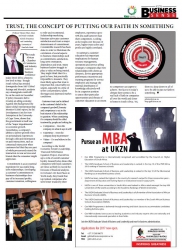Theuns Pelser - Trust, the Concept of Putting Our Faith in Something2016-06-22 The South African Chamber of Commerce and Industry (SACCI) business confidence index (BCI) fell to a historic low level in May. Though South Africa has avoided downgrades from S&P Global Ratings and Moody's, analysts say a downgrade could still be on the cards in December if policy measures fail to revamp an ailing economy. Against this background the latest Global Entrepreneurship Monitor (GEM) report, by the Development Unit for New Enterprise at the University of Cape Town, shows that the government is itself one of the "major impediments" to economic growth. Nonetheless, a company's ability to deliver growth relies on personalised experiences through collected information on past interactions, such as contextual interaction when customers feel that they are part of whole process and extend the interaction to new services and brands that the consumer might appreciate.
Commitment is as an essential ingredient for successful longterm relationships. Developing a customer's commitment in business relationships does pay off in increased profits, customer retention, willingness to refer and recommend. Relationship marketing literature advocates customer satisfaction and trust as major determinants of commitment. Considerable research has been done in order to illuminate the correlation of social aspects in business relationships such as commitment, satisfaction, long-term orientation, dependence and trust. Many business leaders struggle to place a value on being trusted. They might think that it's a good to have, but practically impossible to measure. They most likely agree that trust is important but conceivably not urgent, especially in a time of severe cost pressures, talent shortages and depressed market conditions. Customer trust can be defined as the customer's belief in the company's goodwill, honesty and competence to act in the best interest of the relationship in question. When considering if a company should be called trustworthy, people are looking for:
In summary, customer education has important implications for human resource management, operations and service selling strategies. Companies that view relationships with clients as dynamic, devise appropriate performance incentives and training programs for service employees and manage the internal distribution of knowledge effectively will be in a superior position to assess their particular opportunities and threats of customer education to an extent no competitor can aspire to achieve. The fact is in today's climate there seems to be a real lack of faith in companies all over the world and closer to home in South Africa. Yet, there is a deep desire in all of us to be able to put our faith in something. pelser@ukzn.ac.za http://gsbl.ukzn.ac.za |
Theuns Pelser - Trust, the Concept of Putting Our Faith in Something
Copyright © 2025 KwaZulu-Natal Top Business
